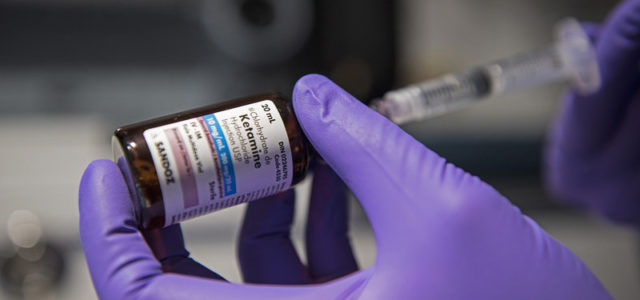Articles about Anxiety from Lori Calabrese, M.D. | The Ketamine Blog
When you feel that sense of dread or uneasiness about something in the present or in the future, that’s anxiety. Everybody feels that way at some point. An interview for a job, meeting your fiancee’s family, a major exam…. But for some people, the unpleasant dread can be overly intense and ongoing. When it’s so intense that it interferes with your life, causing you to miss work, or miss social opportunities… then it may be a disorder. These articles about anxiety shed light on the difference between moments of anxiety, and a lifetime with a severe, debilitating disorder.
Anxiety can be as mild as a transient feeling of butterflies, or so intense and overpowering you think you’re having a heart attack so you call 911.
Types of anxiety disorders:
1. Social anxiety
is the overpowering and relentless fear of being watched and judged by others. It can cause you to feel afraid to meet new people, to believe everyone in the room is talking about you, and to feel intensely self conscious in the presence of others. This is a serious mental health condition that can prevent you from interviewing for jobs or excelling at the one you have, or from meeting new people and building relationships.
2. Postpartum anxiety
This is emerging as a serious disorder in woman, at least as prevalent as postpartum depression. It can express symptoms like panic, fear of harming the baby, poor bonding with baby, obsessive worrying, inability to eat, sleep, or relax. Also, it can include the obsessive fear the panic will never resolve.
3. General anxiety disorder
obsessive and continuous worry about one’s health, work, social contacts and interactions, as well as daily routine circumstances and experiences…that repeat almost every day for at least six months.
4. Panic Disorder
Characterized by repeated and overwhelming panic attacks with accelerated pounding heart rate, sweating, trembling, shortness of breath, and feelings of impending doom. Often brought on by triggers, but not always. The attacks lead to a fear of the attacks, and a driving desire to avoid them, which can often lead to agoraphobia.
5. Test anxiety
Irrational dread of testing in spite of being well prepared. The anxiety can rise until the person’s displaying symptoms of panic like accelerated heart rate, headache, nausea and sweating. Can result in the mind going blank, and general functioning shuts down.
6. Phobia-related disorder
Agoraphobia – fear of enclosed public spaces, fear of open spaces
Arachnophobia – fear of spiders
Acrophobia – fear of heights
Dentophobia – fear of dentists
Claustrophobia – fear of enclosed, confined spaces
Aerophobia – fear of flying
Aquaphobia – fear of water
Zoophobia – fear of animals
Coulrophobia – fear of clowns – (not officially recognized but widely claimed)
7. Separation anxiety
Occurs in children and adults, and expresses as fear of being apart from people to whom they’re attached. They often worry that something terrible will happen to the person they’re connected to, and so avoid separation from that person as well as avoid being alone.
8. Selective mutism
A rare disorder in both children and adults where people don’t speak in specific situations, even though they have well developed language skills. It’s often associated with extreme shyness and fear of social embarrassment, and usually begins before the age of five.
9. Obsessive -Compulsive Disorder (OCD)
Considered to be connected to anxiety disorders, but there is controversy as to whether it belongs here. At the very least, that person who suffers from OCD has feelings of anxiety and usually feels powerless to control the intrusive thoughts they have, or their reaction to them.
This is not an exhaustive list, but rather examples of anxiety disorders.
Treatment of Anxiety Disorders
Some people suffer from a cluster of anxiety disorders and mood disorders combined, while some struggle with only one. Since anxiety disorders are best treated for the specific diagnosis, the more complex a person’s condition is, the more complex it may be to treat.
Transcranial Magnetic Stimulation (TMS)
demonstrates promising outcomes for some types of anxiety. Cognitive behavioral therapy shows the most promising outcomes as a form of psychotherapy. Psychotherapy combined with anxiolytic medicines, serotonin reuptake inhibitors (SRIs) and serotonin norepinephrine reuptake inhibitors (SNRIs) can be helpful, as well.
IV ketamine treatment has demonstrated favorable outcomes in some patients with some types of anxiety. Social anxiety can be debilitating and interfere with the desire to build life, family, and career. Ketamine treatment is one of the most effective treatments for social anxiety. There is exciting work being done with OCD patients and ketamine treatment also.
We invite you to continue reading the following articles about anxiety by Lori Calabrese, M.D.

We celebrated Mother’s Day yesterday. What was it like for you? We truly hope you enjoyed a day of love and hugs as you celebrated with your children. But if you’re a mom who has lost a child, and especially if you’ve lost a child by suicide, this is a day that reminds you of […]
Continue Reading

Originally published in Brain & Behavior Magazine, July 2017 An important discovery has been made at the University of Pittsburgh. It raises the prospect that there may be an entirely new way of relieving major depression in people who repeatedly have failed to respond to existing treatments—people at elevated risk for suicide whose lives are often unrelentingly dark […]
Continue Reading

No Wonder Treatment Resistance Has Been Such a Mystery! Clue: Look in the Cerebral Spinal Fluid! A man in his forties, Greg had never experienced life without depression. Treating mood disorders didn’t seem to be his psychiatrist’s forte. (Oh boy…) At least not in his case. Every accomplishment, every failure, struggled for expression beneath the […]
Continue Reading

In a world where things go wrong and people get sick, every once in awhile something comes along that makes things right again. I’m talking about something that’s so dramatic in its solutions we’re tempted to call it a “miracle.” But we won’t. We’ll call it a game-changer. Because IV ketamine treatment is changing history. […]
Continue Reading

The anesthetic-cum-party drug restores the ability to make connections among brain cells. The Food and Drug Administration’s approval last month of a depression treatment based on ketamine generated headlines, in part, because the drug represents a completely new approach for dealing with a condition the World Health Organisation has labelled the leading cause of disability […]
Continue Reading

“If I see far, it’s that I stand on the shoulders of giants.” If you find yourself feeling alone and forgotten in your symptoms, feeling that there’s no one who really cares, please let me emphasize that there are hundreds, even thousands, of neuroscience researchers, medical doctors with PhDs, biochemists, psychopharmacologists, and psychiatrists who have […]
Continue Reading

Since low testosterone in men has long been presumed to accompany aging, it can be overlooked as a cause of TRD in young men. John had gained 75 lbs (!) through the stressful and exhausting project at work. He’d come to hate the way he looked. Co-workers had turned on each other, undercutting rather than […]
Continue Reading

Ketamine appears to restore faulty connections between brain cells, according to research performed in mice. The anesthetic ketamine can relieve depression in hours and keep it at bay for a week or more. Now scientists have found hints about how ketamine works in the brain. In mice, the drug appears to quickly improve the functioning […]
Continue Reading

A new study shows that weekly ketamine infusions are associated with continued and maintained reductions in depressive symptoms among patients with treatment-resistant depression. The findings, which are considered novel among studies assessing ketamine administration for patients with treatment-resistant depression, evidence the promising role the controversial drug could play in psychiatric care. A team of investigators, led […]
Continue Reading

Too much screen time? Let yourself have 2 more minutes of it right now: because if you’ve been tooling around reading anything related to mood disorders or anxiety disorders, IV ketamine, and other advanced treatments, you’ve probably noticed that there’s buzz about resilience. Because of the world that has opened up since IV ketamine began […]
Continue Reading









